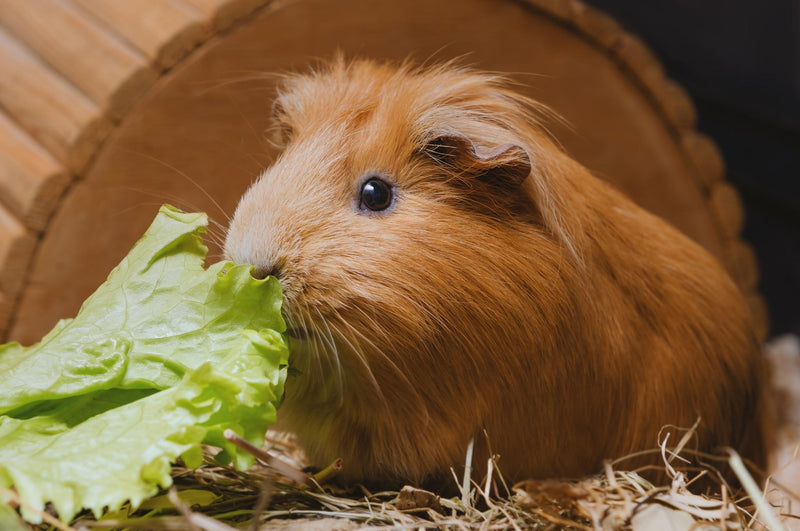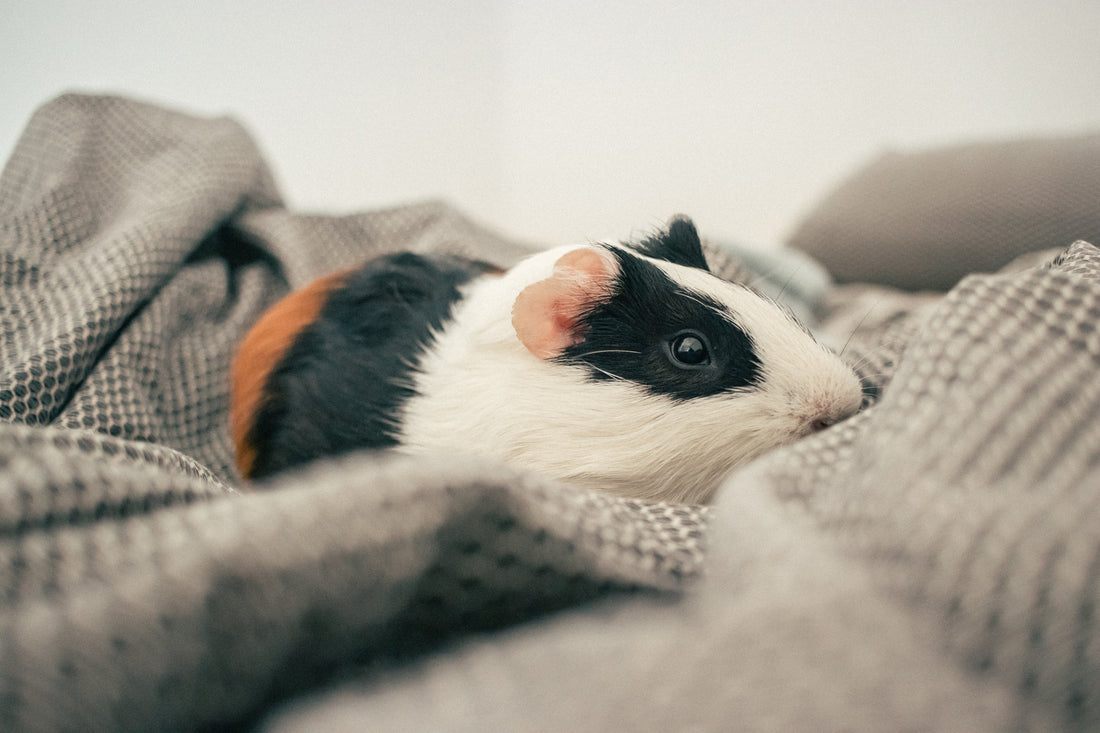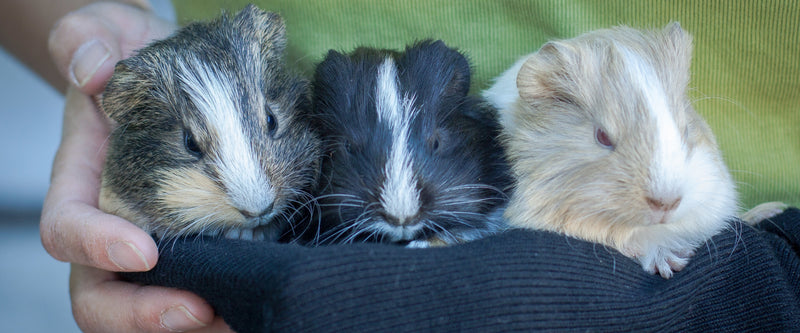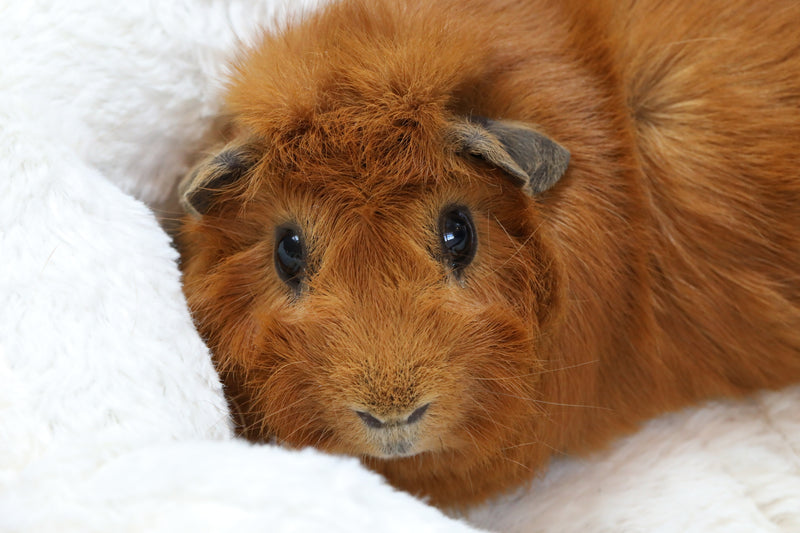
- 29 March 2022
- guinea pigs

If you love guinea pigs as much as we do, then you'll know that this small animal is known for being chatty, with an irresistibly smooth, curly or plush coat depending on the type of piggy you choose.
When caring for these lovable small animals, owners need to know what a healthy piggy looks like and how they should act. Understanding this makes it’s easier to spot when your guinea pig isn’t feeling so perky which is important because changes in behaviour and appetite may mean something isn’t quite right with their health.
Prevention is also better than cure, so dealing with your guinea pig’s problems early or knowing when your guinea pig is feeling a bit under the weather, can make all the difference to your pet making a speedy recovery and ensuring that they don’t become more ill.
A guinea pig health check is important to make sure your piggy is in good health. It is always best to make regular vet visits for routine health checks. This will make sure that you haven’t missed any signs of serious illnesses, and to allow your vet to give your small pet the most effective treatment for getting their health back on track if they do become ill.
If you're a first-time guinea pig owner or just want to know how to take care of your new furry friend, this guide is for you!
Read on to discover the most common ailments to look out for when carrying out a health check on your guinea pigs.

Guinea pigs teeth are open rooted meaning is it true that their teeth are constantly growing. Being fed the correct, hay-based diet along with plenty of things to chew on is important for making sure the length of their teeth is kept in check.
This is why in addition to keeping your guinea pig’s digestive system healthy, it is important to remember that quality hay should make up 80% of your piggy’s overall diet. Hay is an essential source of fibre and is great for wearing your guinea pigs teeth down to stop them from becoming overgrown and painful. This is why hay and grass are really important for your guinea pig’s diet, especially premium quality Timothy Hay.

Providing the correct diet is the most important thing you can do to help your guinea pigs live a long and healthy life. This simple measure can prevent a range of health problems for your small herbivore. If your furry friends are fed the wrong foods or are not given enough safe things to chew such as sticks and toys, then this could lead to serious dental problems causing pain. Not only will this make eating difficult for them, but will potentially lead to further health problems.
Even though feeding your guinea pigs the correct diet can help prevent many dental problems, you must have a regular dental routine for checking your piggies’ teeth, so you can contact your vet as soon as you notice something is wrong.
Unfortunately, your piggy friends are particularly prone to developing mite infestations. The common symptoms to look out for include itchy skin that your guinea pigs will scratch constantly, often leading to hair loss and lots of sore patches.
The good news is that mites can easily be treated by your vet through an injection, given either orally or topically. Mites spread from one guinea pig to another, so it is essential to not only treat your affected guinea pig, but any other furry friends they have been in contact with. You will need to carry out a deep clean in your piggy enclosure; tunnels, toys and all bedding needs to be replaced immediately to avoid any further infestations breaking out and affecting your pets.
Constant scratching may break the skin and cause a secondary infection. However, there is no need to worry since your vet can prescribe antibiotics to clear this up effectively.
Ringworms are a type of fungal infection that is common in guinea pigs, caused by parasites that can live under the skin of your piggies. The infection is commonly characterised by bald patches that start at the top of the head including symptoms such as hair loss, crusty scabs on the skin and excessive scratching. Patches often appear on the face first, around the eyes, nose and ears, then the infection can spread along the back.
Guinea pigs often catch ringworm from another piggy or contaminated objects such as bedding. Ringworm infections will normally clear-up on their own if you are taking good care of your guinea pig ensuring their enclosure is kept clean and hygienic. However, it is always best to take your guinea pig to a vet who can prescribe a course of anti-fungal medication to get rid of the infection quickly and efficiently.
It is also important to remember ringworm is highly contagious to humans and other animals, so it is essential to take extra care while handling an infected guinea pig to prevent cross-contamination.
In the wild, guinea pigs spend most of their time living on grass and never have to walk across hard surfaces. However, within the domestic environment, this is very different. Where rough surfaces or wire mesh enclosures are not suitably covered paws can become swollen, leading to the development of pressure sores on the bottom of their feet called bumblefoot.
Bumblefoot is one of the most common problems in domestic guinea pigs, where the foot becomes swollen due to a bacterial infection, often caused by dirty bedding. This condition is very painful, and if left untreated, it can lead to severe infection and eventually, death. As a responsible piggy parent, you should understand the causes and the signs and symptoms and know how best to treat them.
You can prevent foot issues by ensuring that the flooring of your guinea pigs’ enclosure is covered with soft, comfortable bedding hay. If you like to take your guinea pigs out for socialising, always let them walk on grass or something soft.

Obesity increases the risk of your piggies developing bumblefoot, since being overweight puts more pressure on their paws, especially those housed in a cage with wire on the floor.
Dirty bedding can lead to several health problems for guinea pigs, including flystrike and bumblefoot. Both health issues are serious and potentially life-threatening. One way to prevent both is to always use appropriate guinea pig bedding like hay when setting up their home and keeping it clean.
Guinea pigs are very good at keeping themselves clean, but there is some grooming they need help with including their nails. Cutting guinea pig nails is vital for keeping your piggies' feet healthy since their nails grow quickly and need trimming every couple of weeks. Overgrown nails if left untrimmed can grow into their footpad, resulting in bumblefoot. Regular grooming gives you the chance to check your piggie’s feet and catch any bacterial infections before they become serious. Ask your vet to show you the correct and safe way to cut your guinea pig's nails.
Just like humans, guinea pigs can’t make their own Vitamin C, which is essential because it is used to make collagen that is responsible for healthy joints, skin, gums, and is also used in wound healing. What’s more, it is vital to our immune systems and helping us fight illnesses.
If your piggies don’t get enough of this vital vitamin in their diet, their body’s supply will quickly run out, leaving them vulnerable to scurvy. This disease stops your guinea pigs bodies from creating collagen, which is important for bone and tissue formation and can lead to lots of health problems in your guinea pig’s joints and skin.
However, scurvy can be prevented by feeding your guinea pig the appropriate diet with plenty of vitamin C. Although Timothy Hay provides a natural source of vitamin C and should make up a bulk of your guinea pigs diet, it does not provide enough for your piggy to thrive on. This is why it’s a good idea to provide a small teaspoon sized daily ration of natural fresh greens, such as a few dandelion leaves or a small bunch of parsley, which are rich in vitamin C, but take care not to over feed these foods to your piggy as too much could cause your pet to develop diarrhoea.
Flystrike is a potentially life-threatening condition that is caused when flies lay their eggs around a guinea pig’s bottom. The eggs hatch into maggots which mature and eat away at the surrounding flesh.
This horrible condition particularly thrives when the weather is hot and unfortunately, in the summer months it can take just a couple of hours to take effect. This means you should check the rear region of your guinea pig at least twice a day to catch the condition early. If you think your piggy has flystrike, call your vet immediately for medical attention, where the vet will clip away the fur, remove the maggots, and give antibiotics to help prevent infection. Anti-parasitic treatments will also be given to kill any remaining maggots.
Just like us, a common health problem for guineas is colds, often resulting from drafts, dampness or sudden temperature changes. Even though the actual cold tends not to be too serious, it can quickly turn into pneumonia, which does need urgent veterinary attention in the form of antibiotics.
Always make sure your guinea pigs are kept in a warm place and frequently change their bedding so it doesn't get damp and cold. They should never be kept outside during the winter months, so make the most of enjoying spending time with them outside during the summer months on the grass.

All pets develop tumours, but guinea pigs seem to be more prone to skin and mammary tumours. If you notice any lump or bump on your piggy, make an appointment with your vet to get it checked out just to be safe. Most are harmless and removed through surgery, but if your vet is concerned, they can carry out further tests.
For more information about what to feed your piggy friends, check out our guinea pig feeding guide for information on the perfect piggy diet.


